It may be one of the most annoying things in our life that the SD card in your phone, camera, laptop, or other portable devices is formatted accidentally. Are my files still there after such a catastrophe? Can I get the necessary documents back? What should I do to resolve the problem?
If you are facing a similar plight, you are probably interested in this article. First of all, we will introduce some basic information about SD card formatting. Then, some practical solutions will be offered to help you recover formatted SD cards. It doesn’t matter if you’re a Windows user or a Mac user, there must be a suitable method for your need.
Preparation for the Recovery of Formatted SD Cards
There are two types of SD card formatting methods, i.e. quick format and full format. Both these two kinds of formatting will not erase the data on the SD card permanently. To be more specific, during the formatting process, some actions will be taken to make the data inaccessible by conventional means.
However, the powerful data recovery tools will enable you to get the necessary data back. Before starting the recovery process, follow this guidance to get ready.
➤ Stop Using the Formatted SD Card
The most important step in the preparation phase is to stop using the formatted SD card. First of all, if you keep saving new files on the card, the new data will have the potential to overwrite the sectors that previously held the lost files. This operation may also result in changes to the file system. That is why you should stop using the SD card immediately.
➤ Check for Write Protection
There is usually a physical lock on an SD card to control the write permissions. This feature is designed to prevent the data on SD cards from being modified or deleted. However, the write protection will also cause data recovery software to fail to access the SD card and recover the formatted data. Thus, you need to ensure the switch is in the “unlocked” position.
➤ Prepare Recovery Software and Accessories
In this stage, you need to select adequate data recovery software to restore the formatted SD card. In addition to that, a suitable SD card reader or adapter is also necessary. It’s important to consider its compatibility with the type (like SDHC, SDXC, etc.) as well as the physical size of your SD card.
Method 1. Recover Formatted SD Card Using Command Prompt
The command prompt or CMD is an efficient and free solution to recover lost data from a formatted SD card on Windows. This built-in program is capable of managing the file system, and that enables you to change the attributes and run basic disk checks via a few commands. These features make CMD one of the best choices for restoring a formatted SD card.
But it’s worth noting that this command-line interface may be unfamiliar to most people, especially to those who don’t have any technical background. If you are not very clear about how to operate this tool, the following guidance will help you get your files back:
Step 1. Use a card reader to connect the SD card to the computer.
Step 2. Open the Menu, type “cmd” in the search box, and press the Enter button. Then you will see the program named “cmd.exe” in the list.
Step 3. Click the “cmd.exe” program and the command prompt window will turn out.
Step 4. Type “chkdsk /f LETTER_OF_DEVICE:” or “chkdsk LETTER_OF_DEVICE: /f” in the window, either is viable. In the following example, the device is “d”.
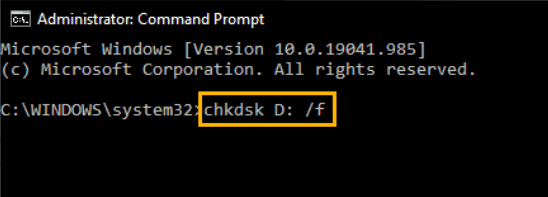
If everything goes well, the corrupted SD card then will be successfully repaired and you can access your lost photos.
Method 2. Restore Formatted SD Card with Terminal
Just like the Command Prompt on the Windows operating system, there is also a built-in command-line tool on macOS. One of the key features of Terminal is its strong compatibility. For example, it can also run on the Linux system and support a wide range of file systems. That means Terminal is able to many types of SD cards, such as exFAT, FAT32, NTFS, and so on.
However, it’s essential to be familiar with the operation of the Terminal. Incorrect commands may lead to further data loss. Before trying to restore the formatted SD card using Terminal, you should read tutorials and guidelines. The following tutorial will guide you through using Terminal properly.
Step 1. First of all, you need to download and install open-source software that is named PhotoRec from its official website.
Step 2. Connect your SD card with your Mac directly or with a card reader, and enter your Mac password to start the Terminal program.
Step 3. Enter “sudo photorec” and press the Return button.
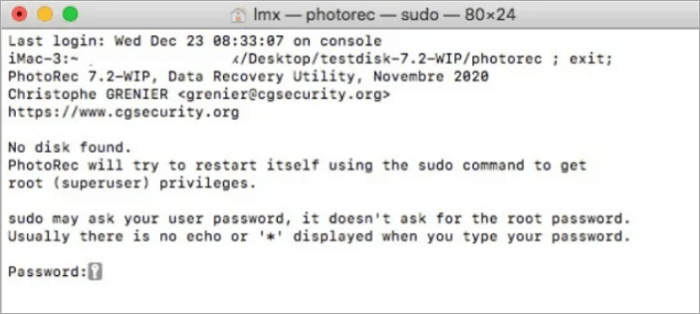
Step 4. Select the device on behalf of your SD card on Mac and press the Enter button. Then, select the partition and the device’s file system in a similar way.
Step 5. Choose your desired destination folder to save the file recovered from the SD card. After the selection, press the C button on the keyboard when you have selected the output folder, to start the scan and recovery.
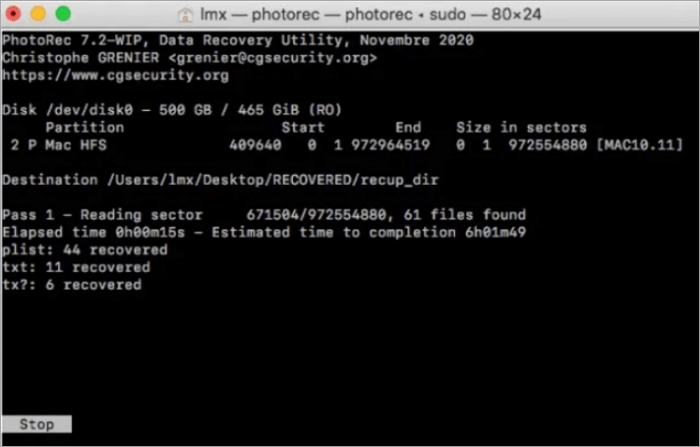
When the process is completed, Photorec will present the total recovered files and destination folder in the window. Press the Enter button on the single preselected Quit option to exit the app. Then you will find your lost photos in the selected folder!
If the SD card doesn’t show on your Mac, try the tutorial in this post: >> Fix the Error of SD Card Not Showing Up on Mac
Method 3. Recover Data from formatted SD card with Software
In the previous two parts, we introduced the characteristics of 2 built-in command-line tools on Windows and macOS. We mentioned that although these programs are both free to use, you must pay a lot of attention to the operations, since the wrong steps may lead to further data loss.
Luckily, some third-party data recovery tools are secure and easy to use. As one of the excellent choices, ONERECOVERY ensures data integrity with a very high rate of successful recovery. Its powerful compatibility enables it can work smoothly on many versions of Windows systems and macOS, including Windows 10/11, macOS Monterey, Ventura, Sonoma, and so on.
Step 1. Download and install this all-in-one SD card recovery software on your PC or MacBook.
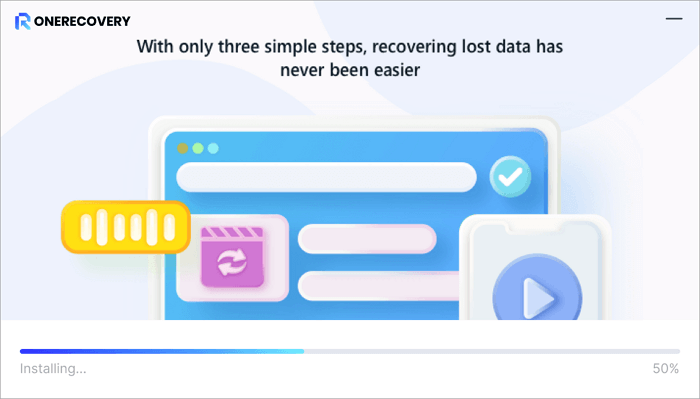
Step 2. Scan the formatted SD card you want to restore. ONERECOVERY offers you 2 types of scanning modes, i.e. Quick Scan and Deep Scan.
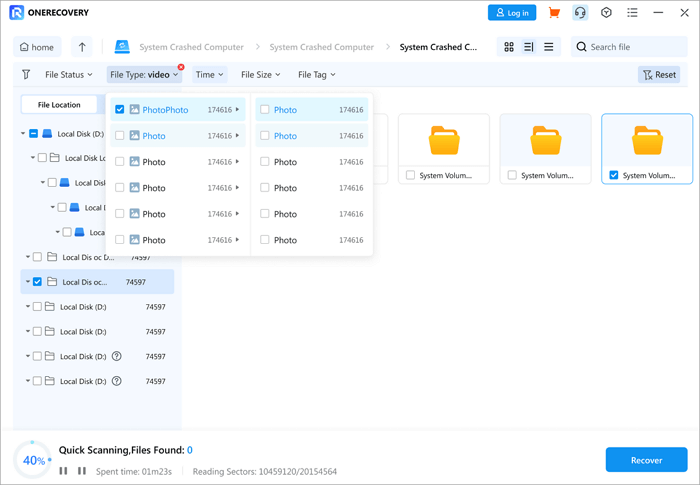
Step 3. Select the files on the scan result list to preview, then click on the Recover button to get the files back.
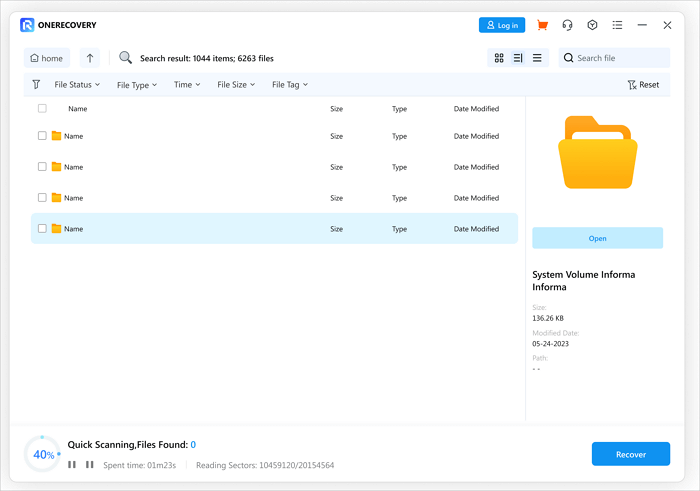
For users of SanDisk memory cards, there is a post that offers you more detailed guidance.
Conclusion
This post introduced three available tools for SD card recovery on Mac and Windows. If you are very familiar with CMD or Terminal, it’s a good choice to use these two built-in command-line programs as they are both convenient to use. However, it’s recommended for novices to choose ONERECOVERY as the learning curve of this software is not as steep as using CMD and Terminal.
FAQs About Recovering Formatted SD Card
The following FAQs will provide you with more information about the formatted SD card so that you can know more about how to choose the best solutions for restoring it.
What does format mean on an SD card?
Formatting an SD card means that a new file system and an initial set of organizational structures are established to store or retrieve data. The SD card formatting process will erase all existing data on the formatted SD card. For those who want to improve the overall performance of a memory card, this method is useful as it will help remove file fragments.
How long does the process of photo scanning and recovery cost?
Nowadays it usually will not take too long for such software to finish the scan and recovery as the technology has developed a lot. If you use ONERECOVERY, the powerful desktop data recovery software, you will spend comparatively less time in it, which can be no longer than 2 minutes in general.
Can the lost photos be recovered if the SD card is formatted twice?
Yes, photos can be recovered after the SD card is formatted twice. However, you must ensure that the card is formatted with a quick format and there is no data written into it after formatting, or you will quite probably fail to recover the lost pictures successfully.
Learn More About SD Card Recovery:
How to Recover Deleted Photos from SD Card
Vanessa is a professional editor with a strong foundation in computer information technology. Since graduating, she has dedicated her career to create content in IT fields. In the past three year, she has accumulated sufficient knowledge in data recovery, computer problems troubleshooting and application of multimedia software.
She has been trying her best to bridge the gap between complex technical concepts and accessible, reader-friendly content.







